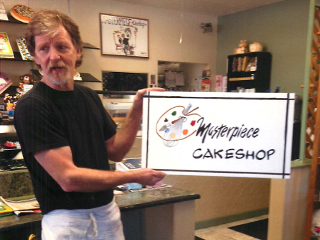The Supreme Court May Soon Decide the Limits of Religious Freedom
Posted on October 4, 2017 in Public Policy, Religious Freedom by Nathan Cherry
 One of the most important cases in recent history will be heard before the Supreme Court to determine if religious rights apply to business owners.
One of the most important cases in recent history will be heard before the Supreme Court to determine if religious rights apply to business owners.
In 2012 a cake artist named Jack Phillips politely declined to create a cake for a same-sex wedding. The couple requesting the cake were previous customers of Phillips’ cake shop where he had created cakes for other events for the couple. But this time, Phillips said his faith would not allow him to celebrate an event he believes is a sin.
As you can imagine, the couple sued, saying Phillips discriminated against them. The baker in Colorado was now in the middle of a lawsuit that became a national story and has continued to gain attention to this day. What makes this is interesting is that, according to a recent report, other bakers in Colorado were permitted to refuse to bake cakes due to the message being promoted.
For Phillips though, it was never about attention or anything else superficial. Phillips simply wanted to live out his deeply held religious convictions at his business. Now, Phillips is fighting to avoid being forced to violate his religious convictions under threat from the government.
I’ve written about the lawsuits brought by homosexuals against Christians on many occasions. I’ve read their stories and considered their position as Christians seeking to live and do business according to their faith. A question I’ve often pondered is: what would I do if a local business owner refused to serve me because I am ____?
That blank could say white, male, Christian, conservative, or any number of other adjectives. What would I do? Would I sue the owner for refusing to serve me? Do I really want to force someone to serve me? Do I want to send the message to other business owners that if they don’t do things the way I want I will take ’em to court?
As I’ve considered this question time and again using different scenarios, deli, dry cleaner, barber, gas station, I come to the same conclusion: I’d walk away.
I have gladly refused, over the years, to shop at certain places because I do not agree with their position on certain issues. I stopped shopping at Target years ago when they became a vocal advocate for same-sex “marriage” and confusing gender lines. I stopped going to Starbucks when they decided to vocally push for same-sex “marriage” and criticized gun rights advocates. I haven’t drank Pepsi in more than a decade after they admitted to using aborted baby tissue in their flavor testing research.
I didn’t sue anyone. I didn’t threaten violence against anyone’s family. I walked away. I chose to spend my money at places that align with my beliefs, or, at least at places that are not hostile against my beliefs. Just as I want the right to refuse to serve someone based on my religious convictions, I support the right of every business owner to “discriminate” based on their sincere beliefs. As a comment by Phillips’ attorney with Alliance Defending Freedom makes clear, this is a right everyone should support:
“Tolerance should be a two-way street. Phillips gladly serves anyone who walks into his store, but, as is customary practice for many artists, he declines opportunities to design for a variety of events and messages that conflict with his deeply held beliefs…The First Amendment protects Jack’s right to create artistic expression that is consistent with his core convictions. Individuals can support both same-sex marriage and Jack, and people should have the right to disagree on critical matters of conscience. The same government that can force Jack to violate his faith and conscience can force any one of us to do the same.”
It’s a chilling reality to realize that if the government can force Jack Phillips, under threat of legal penalty, to violate his core convictions, that same government can (and will) force us all to violate our conviction at some point. No one that loves liberty and freedom should desire to see such authority placed in the hands of any government.
Numerous friend-of-the-court briefs have been filed in support of Jack Phillips and his right to live and do business according to his convictions. Some of the briefs have simply made clear that no artist should be compelled to create art that violates his or her conscience. “Artistic speech,” as one brief states, “is constitutionally protected:”
“Artistic speech, whether expressed through painting a picture, taking a photograph, or designing a cake, is constitutionally protected and should be treated as such. The expression should neither be silenced nor coerced. Though the concern is currently most pressing in the same-sex wedding context, it is not so limited. Creative professionals of all stripes stand to suffer from undue compulsion, depending on how this Court rules here.”
Indeed there’s a lot riding on this case.For many Christian wedding vendors this case could decide the future of their business. Bakers, florists, and photographers, to name a few, will be watching this case closely, praying that the Supreme Court rules on the side of freedom.
The ripple effect of the Supreme Court’s ruling in this case will stretch far and wide. For couples seeking to get married it could mean finding a new vendor. For artists of various types it could mean closing their business, or, being able to live and do business according to their sincerely held convictions. The distinction between the two outcomes is far more important for individual liberty and freedom than we might realize.
